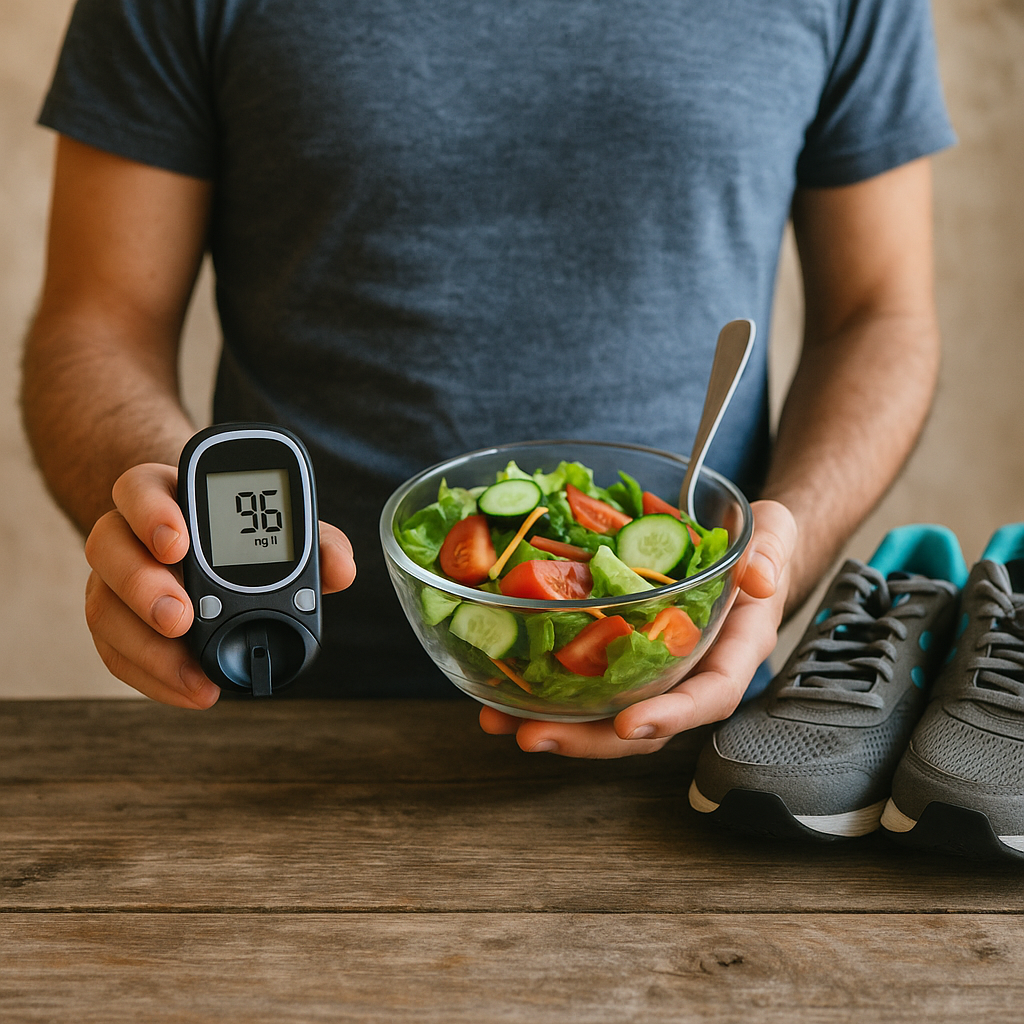Ask Ayurvedic doctor a question and get a consultation online on the problem of your concern in a free or paid mode. More than 2,000 experienced doctors work and wait for your questions on our site and help users to solve their health problems every day.
How to Prevent Diabetes: Ayurvedic Lifestyle, Foods, and At-Home Care

Let’s be honest — the idea of diabetes creeps into more and more conversations these days. You hear about it from friends, coworkers, maybe even doctors at routine checkups. It’s no longer just something older folks worry about. People of all ages are waking up to the importance of knowing how to prevent diabetes — and not just through modern medicine. Many are turning to Ayurveda, ancient healing practices, and lifestyle shifts to find balance and resilience.
In this guide, we’re going to dive deep into ways to prevent diabetes, including foods that prevent diabetes, Ayurvedic remedies, and how to set up a sustainable diabetes care at home routine. Whether you’re trying to reverse diabetes naturally, keep your sugar in check, or just avoid getting it in the first place — this is for you.
How Ayurveda Explains the Root Causes of Diabetes
In Ayurveda, diabetes isn’t just about high blood sugar. It’s considered a result of imbalances in the body's doshas (Vata, Pitta, and Kapha), poor digestion, and toxin build-up — called Ama. The condition most closely resembles what's called “Madhumeha”, meaning “sweet urine.”
Rather than focusing only on insulin or glucose, Ayurveda sees diabetes as the body’s way of signaling deeper dysfunction. It's often linked to a sedentary lifestyle, stress, overconsumption of sugary or processed foods, and a disconnection from nature’s rhythm.
Kapha dosha, in particular, is believed to play a major role. When Kapha becomes excessive — think heaviness, sluggishness, weight gain — it slows down digestion and metabolism. Over time, this leads to insulin resistance and fat accumulation, key factors in both Type 2 diabetes and prediabetic states.
So prevention isn’t just about diet. It’s about restoring balance on every level: physically, mentally, emotionally.

Foods, Exercises, and Natural Remedies to Prevent Diabetes
Ayurveda offers practical tools — no crazy restrictions, just conscious choices. Combining the right diet to prevent diabetes, herbs, and movement, we can create a daily rhythm that supports healing and resilience.
Ayurvedic Diet and Foods That Prevent Diabetes
One of the cornerstones of Ayurvedic diabetes care is a diet that supports Agni, or digestive fire. When your digestion is strong, your body can metabolize food efficiently and eliminate waste properly. That’s a huge deal when it comes to preventing diabetes.
Here are some foods that prevent diabetes and are regularly recommended by Ayurvedic practitioners:
-
Bitter gourd (karela): Known to regulate blood sugar.
-
Fenugreek seeds (methi): Soaked overnight, they improve insulin sensitivity.
-
Turmeric: Anti-inflammatory and balances blood sugar.
-
Cinnamon: Helps improve insulin function.
-
Barley and millets: Low glycemic index, great alternatives to refined grains.
Avoid cold, heavy, oily foods and excess dairy. Sugar and artificial sweeteners are a no-go — obvs, but we’ll say it again. Instead, use jaggery or stevia occasionally (not every day).
Pro tip? Eat your meals warm, fresh, and with mindfulness. Cold smoothies and leftover pizza? Delicious, sure, but a digestion disaster in Ayurvedic terms.
Exercises for Diabetes Patients at Home: Best Practices
When it comes to exercises for diabetes patients at home, Ayurveda recommends gentle yet consistent movement. You don’t have to go hard on HIIT or run marathons. Movement is medicine, and it should feel that way.
Here’s what works well:
-
Morning walks: A 30-minute walk at sunrise stimulates metabolism and reduces Kapha accumulation.
-
Yoga: Focus on asanas like Trikonasana (Triangle pose), Ardha Matsyendrasana (Spinal twist), and Paschimottanasana (Seated forward bend).
-
Pranayama (breathing practices): Especially Kapalabhati and Anulom Vilom — both help detoxify and oxygenate the blood.
Looking for the best exercise for diabetes at home? Combine mindful yoga with light strength training using bodyweight. Nothing too intense, but enough to get the blood moving and keep insulin working.
Reversing Diabetes Naturally: Herbs, Detox, and Daily Routine
So, what about actually reversing diabetes naturally? Is that even possible? Well, while mainstream medicine might hesitate to use the word reverse, Ayurvedic wisdom — paired with modern lifestyle changes — suggests it can happen. And yes, many people have successfully done it.
Let’s break it down: the goal isn’t just to lower blood sugar temporarily, but to actually change the environment in your body that allowed diabetes to develop in the first place. That’s where natural remedies, herbs, and daily rhythms come into play.
Herbal Support
Here are some time-tested Ayurvedic herbs known to help regulate blood sugar:
-
Gudmar (Gymnema sylvestre): Literally means "sugar destroyer." It reduces sugar cravings and helps regenerate pancreatic cells.
-
Vijaysar: A wood often soaked in water overnight and drunk the next morning. Said to help stabilize glucose levels.
-
Amla (Indian gooseberry): Packed with antioxidants and supports the pancreas.
-
Neem: Bitter, powerful, and blood-purifying. Not the tastiest, but very effective.
These herbs are not meant as a one-time fix. They work best when integrated into a consistent routine along with mindful eating and exercises for diabetes patients at home.
Daily Detox Practices
Ayurveda emphasizes regular detox to eliminate built-up toxins (Ama) — which can clog up the body’s channels, impair digestion, and lead to insulin resistance.
Simple detox tips:
-
Drink warm water with lemon or ginger first thing in the morning.
-
Avoid eating late at night (your digestion sleeps too, ya know).
-
Try a mild Triphala supplement before bed — helps cleanse the gut and support elimination.
Some go further and do seasonal detoxes (like Panchakarma), but that’s a whole thing. For now, just start small and stay consistent.
Daily Routine (Dinacharya)
One of the biggest game-changers? Aligning with the body's natural rhythms.
Wake up early (before 6:30am if you can), move your body, eat meals at regular times, and aim to sleep before 10pm. Wild idea, huh? But your hormones — including insulin — love predictability.

Long-Term Home-Based Diabetes Care and Self-Discipline
Once your sugar is under control (or even before that), you need a game plan for the long haul. Because diabetes isn't just a "fix it and forget it" kind of situation.
Establishing good diabetes care at home isn't about being perfect. It’s about building routines that work with your life, not against it.
Dinacharya and Sleep Rhythm for Sugar Control
Here’s where things get real. Poor sleep can seriously mess with your blood sugar. Studies show that even one night of bad sleep can increase insulin resistance the next day. Yep, it's that sensitive.
Try these tips:
-
Stick to consistent sleep and wake times.
-
Avoid blue light from screens at least 1 hour before bed.
-
Take warm baths with Epsom salt or lavender oil to relax.
-
Sip warm Ashwagandha tea in the evening to calm the nervous system.
This isn’t about being a monk. It’s just about helping your body function the way it’s designed to.
Stress Management, Herbal Tonics, and Sustainable Habits
Stress is a sneaky villain in the diabetes story. Cortisol spikes — from work, relationships, or even constant phone notifications — can wreak havoc on your blood sugar levels.
Ayurveda suggests:
-
Daily meditation or breathwork — even just 10 minutes helps.
-
Adaptogenic herbs like Ashwagandha, Tulsi, and Brahmi to support the nervous system.
-
Avoid multitasking while eating. Chew. Breathe. Taste. (Yeah, we forgot how to do that somehow.)
And remember — sustainability matters more than intensity. It's better to walk 20 minutes every day than to do one 2-hour workout once a week and burn out. Start small, grow slow. Build the habit, not the hype.
Conclusion
Let’s be clear — diabetes is not a life sentence. With the right lifestyle, mindset, and support, you can absolutely take charge of your health. Ayurveda teaches us that the body is incredibly intelligent and capable of healing, if we learn to listen to it and work with its rhythms, not against them.
Whether your goal is to prevent diabetes, manage it better, or even explore how to reverse diabetes naturally, the path starts at home. Not in a bottle of pills or in a crash diet program, but in the small, daily decisions that shape your metabolism, your energy, and your well-being.
So don’t aim for perfect. Just aim for progress. Wake up a little earlier. Choose bitter gourd over fries. Replace doomscrolling with a short walk. These changes add up — and fast.
Oh, and one last thing? Share this with someone you care about. Diabetes isn’t just your battle — it’s something so many people silently struggle with. Let’s break that silence and build healthier habits together.
If you’re ready to take control of your health — or help someone you love do the same — start with small, daily actions. Share this guide. Try one new food or one Ayurvedic practice this week. Even just 5 minutes of movement in the morning can shift your entire day.
And if you found this article helpful, bookmark it, share it, or send it to someone who needs to hear this message. Together, we can make diabetes care at home not just possible — but powerful.
FAQs
What is the #1 cause of diabetes?
The #1 cause of Type 2 diabetes is insulin resistance, often triggered by poor diet, inactivity, chronic stress, and excess body fat — especially around the belly. Genetics play a role, yes, but lifestyle is a huge factor. And the good news? Lifestyle can be changed.
According to Ayurveda, it’s also deeply linked to sluggish digestion, toxin accumulation (Ama), and loss of metabolic fire (Agni). That’s why prevention isn’t just about sugar — it’s about strengthening your digestion and restoring balance.
How do I tell if I have diabetes?
Common signs include:
-
Frequent urination
-
Excessive thirst or hunger
-
Fatigue
-
Blurred vision
-
Unexplained weight loss
-
Slow-healing wounds
But here's the tricky part — many people have no obvious symptoms early on. That’s why regular check-ups, especially if you have a family history or other risk factors, are super important.
If you’re unsure, ask your doctor about a fasting blood glucose test or an HbA1c test. Don’t wait until it becomes urgent.
Can stress cause diabetes?
Not directly, but yes — chronic stress can contribute to diabetes over time. When you're constantly stressed, your body releases cortisol, which increases blood sugar levels. If this happens frequently, your body can become less responsive to insulin.
In Ayurveda, stress is seen as a major disruptor of both Vata and Pitta doshas, throwing off sleep, digestion, and hormonal balance — all of which play a role in blood sugar regulation.
So managing stress isn’t just a mental health thing. It’s a blood sugar thing, too.

